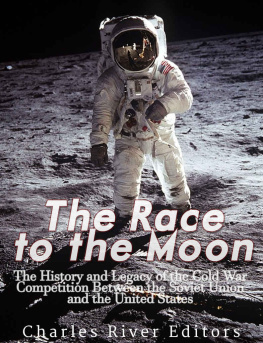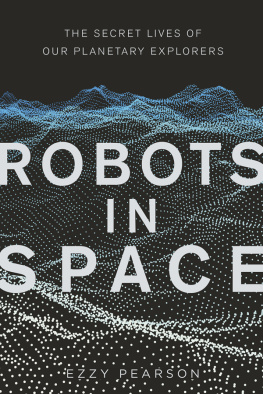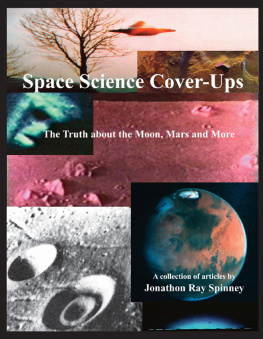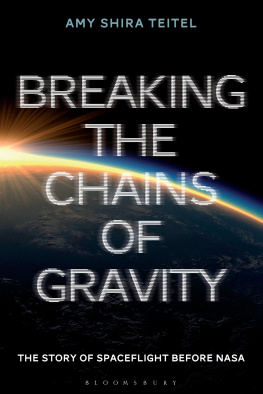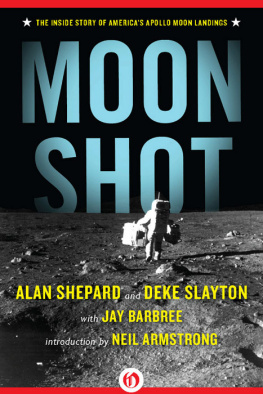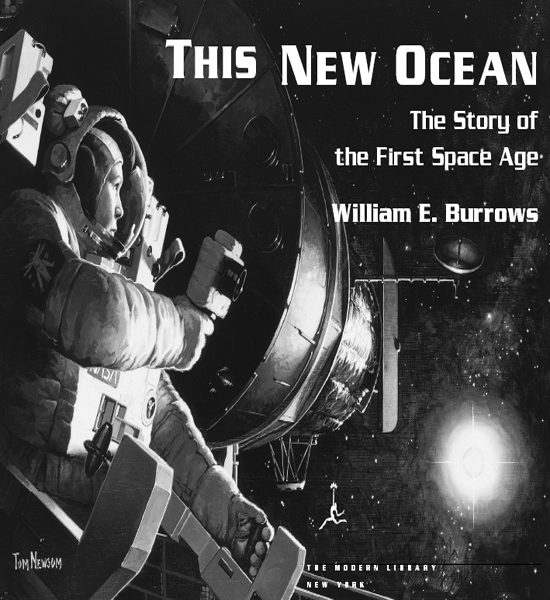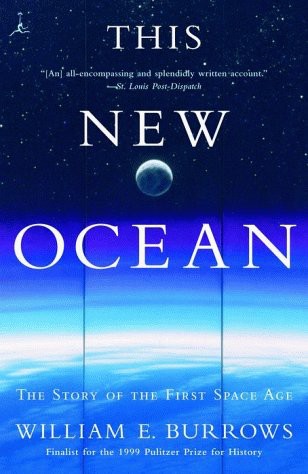
Painstakingly and exhaustively lays out the history of the human quest for space. Provides much new information from the Russian side of the race, having been given unprecendented access to records there.
New York Newsday
Arguably the most comprehensive history of rocketry and space travel ever.
Booklist
Burrows brings to the effort a style that is by turns eloquent, witty, sardonic, and simple. He is never dull, not even when describing complicated technology or bureaucratic mucking about. This New Ocean is a dandy piece of writing. And it tells a dandy tale.
St. Louis Post-Dispatch
An incisive and lucid account of humanitys leap into space an illuminating study of Cold War machinations.
The Philadelphia Inquirer
An encyclopedic history of space exploration by an insider and veteran reporter who has lost nothing in his enthusiasm and respect for what humankind has wrought. Likely to be the bible for those tracking a unique period in Earth historythe first space age.
Kirkus Reviews
This New Ocean is a valued resource for the reader fascinated by the topic of spaceflight and eager to catch up as the second age gets under way.
Houston Chronicle
A very solid and weighty tome detailing our fascination with space and the great beyond.
The San Diego Union-Tribune
Displays a refreshing wit and a somewhat ironic attitude about humanitys struggle to escape the confines of Planet Earth. This is no puff piece from NASA. Frustration, failure, tragedy, and bitter competition are intertwined in this story with the glorious moments when something worked as planned. My guess is that readers will be amazed, as I was, by the fact that there is so much to learn about the story of space exploration, and by the sheer number and quality of people who have contributed so far.
Sunday Republican (Springfield, MA)
Distinguished by its comprehensivenessthe authors extensive research is obviousand its evenhandedness likely to stand as a worthy history of our first space age well into our second.
Savannah Morning News
ALSO BY WILLIAM E. BURROWS
Critical Mass: The Dangerous Race for Superweapons in a Fragmenting World (with Robert Windrem)
Exploring Space: Voyages in the Solar System and Beyond
Mission to Deep Space: Voyagers Journey of Discovery
Deep Black: Space Espionage and National Security
On Reporting the News
Vigilante
Richthofen
1999 Modern Library Paperback Edition
TITLE PAGE ILLUSTRATION: In this hypothetical future scene, a camera-carrying astronaut in a Manned Maneuvering Unit is on a maintenance visit to the Hubble Space Telescope. (To Extend Our Vision, by Tom Newsom, NASA Art Program)
Copyright 1998 by William E. Burrows
All rights reserved under International and Pan-American Copyright Conventions. Published in the United States by Random House, Inc., New York, and simultaneously in Canada by Random House of Canada Limited, Toronto.
Modern Library and colophon are registered trademarks of Random House, Inc.
Originally published in hardcover by Random House, Inc., in 1998.
Grateful acknowledgment is made to the following for permission to reprint previously published material:
AMERICAN ASTRONAUTICAL SOCIETY: Excerpts from History of Rockets and Astronautics. This material was originally presented at the 17th History Symposium of the International Academy of Astronautics, Budapest, Hungary, 1983, and was originally published in the AAS publication History of Rocketry and Astronautics, American Astronautical Society History Series, vol. 12, John L. Sloop, editor, pp. 7071, 1991. Copyright 1991 by American Astronautical Society. This material is reprinted here by permission of the AAS.
Aviation Week & Space Technology: Excerpt from the editorial Voyager the Intrepid from the August 28, 1989, issue of Aviation Week & Space Technology. Reprinted by permission of Aviation Week & Space Technology.
FARRAR, STRAUS & GIROUX, INC. AND INTERNATIONAL CREATIVE MANAGEMENT: Excerpts from The Right Stuff by Tom Wolfe. Copyright 1979 by Tom Wolfe. Rights in the British Commonwealth are controlled by International Creative Management. Reprinted by permission of Farrar, Straus & Giroux, Inc. and International Creative Management.
MRS. MILDRED K. LEHMAN: Excerpts from This High Man: The Life of Robert H. Goddard by Milton Lehman [New York: Farrar, Straus & Giroux, Inc., 1963 (hardcover) and New York: Da Capo Press, 1988 (paperback)]. Reprinted by permission of Mrs. Mildred K. Lehman.
THE MCGRAW-HILL COMPANIES: Excerpts from The Papers of Robert H. Goddard, edited by Esther Goddard and Edward Pendray (New York: McGraw-Hill, Inc., 1970). Copyright 1970. Reprinted by permission of The McGraw-Hill Companies.
WILLIAM MORROW & COMPANY, INC.: Poem from pages 5758 of A Bakers Nickel by William Cohen. Copyright 1986 by William Cohen. Reprinted by permission of William Morrow & Company, Inc.
NATIONAL GEOGRAPHIC SOCIETY: Excerpt from Columbias Landing Closes a Circle by Tom Wolfe from the October 1981 issue (vol. 160, no. 4, p. 474) of National Geographic. Reprinted by permission of National Geographic Society.
The New York Times: Excerpt from The New Soviet Arms Build-up in Space by Robert Jastrow (October 3, 1982). Copyright 1982 by The New York Times Company. Reprinted by permission.
Library of Congress Cataloging-in-Publication Data
Burrows, William E.
This new ocean: the story of the first space age/William E. Burrows.
p. cm.
eISBN: 978-0-307-76548-2
1. Outer spaceExploration. 2. Astronautics. I. Title.
QB500.262.B87 1998
629.4dc21 98-3252
Modern Library website address: www.modernlibrary.com
v3.1
To Galileo, Magister of the glass eye.
Thanks for everything.
Foreword
Carl Sagan once rhapsodized about having lived at the perfect time. If he had been born fifty years earlier, the eloquent astronomer explained, he would have missed planetary exploration entirely because it would have been only figments of the speculative imagination. Born fifty years later, he would have been just as unlucky because he would have missed the thrill of the beginning of travel to other worlds.
In all the history of mankind there will be only one generation which will be the first to explore the solar system, one generation for which, in childhood the planets are distant and indistinct discs moving through the night, and for which in old age the planets are places, diverse new worlds in the course of exploration, Sagan said in a lecture in 1970. There will be a time in our future history when the solar system will be explored and inhabited by men who will be looking outward toward the first trip to the stars. To them and to all who come after us, the present moment will be a pivotal instant in the history of mankind.
Sagan spoke for many, including myself, who believe that along with the inevitable afflictions of advancing age comes the infinitely greater reward of having been privileged to witness one of the truly great and lasting human endeavors: the beginning of the migration to space.
Sagans words came back to me on the evening of May 15, 1997, as I sat in the darkened IMAX auditorium of the National Air and Space Museum in Washington and watched American astronauts and Russian cosmonauts, standing side by side under a spotlight, being heartily applaudedcongratulatedby eight hundred people who knew they had bravely led humanity off the planet for the first time in what no one in the room doubted was the beginning of the same kind of endless odyssey that drives other creatures on Earth to their own immense journeys. Everyone who was there that night knew that they were sharing a historic moment. The first space age was over. The second was under way.


